Lip Stick and other Lip Products
The quest for the perfect lipstick has been a struggle of mine for quite some time. Finding the perfect shade, color, and texture is hard enough, but then factoring in pricing and sustainability takes things to an entirely new level. Luckily, after hours of research, I have found several lip products that are good for the earth and affordable! Note: Pricing is ranked from one $ to five $.
Axiology
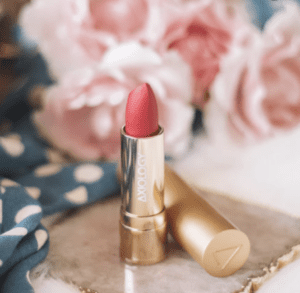
Other products: Hand care (lotions and soaps) and merchandise
Price: $
Eco-Friendly Ingredients: ![]() – all organic, ethically sourced, and gluten-free
– all organic, ethically sourced, and gluten-free
Palm Oil Free:![]()
Sustainable Packaging: ![]() – All of their materials are recyclable with the exception of their crayons.
– All of their materials are recyclable with the exception of their crayons.
Cruelty-free:![]() – “100% evil free”
– “100% evil free”
Overall Quality: ![]() – All products come in a large variety of colors and their use of shea butter and other healthy ingredients are great for your lips.
– All products come in a large variety of colors and their use of shea butter and other healthy ingredients are great for your lips.
Additional Benefits: Axiology is devoted to stopping animal cruelty, they support Orangutan Foundation International, and support women. The company is led by women and their packages are made by an all-women recycling company. Exciting news- you can order samples for just $2.00!
Vapour
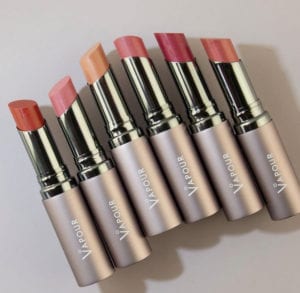
Products: Lip stick, “Lip Nectar”, “Lip Conditioner” (Chap Stick), Liquid Lip Stick, and Lip Gloss
Other Products: Makeup, Skincare, Deodorant, and Makeup Brushes
Price: $
Eco-Friendly Ingredients: ![]() – 100% natural ingredients, vegan, and gluten-free
– 100% natural ingredients, vegan, and gluten-free
Palm Oil Free:![]()
Sustainable Packaging![]() – All packaging is eco-friendly and sustainable, customers are also rewarded for returning empty containers to be processed by Vapour.
– All packaging is eco-friendly and sustainable, customers are also rewarded for returning empty containers to be processed by Vapour.
Cruelty-free:![]() – No animal harm whatsoever
– No animal harm whatsoever
Overall Quality: ![]() – All lipsticks and other makeup have no dyes and are pigmented by fruit and the natural ingredients.
– All lipsticks and other makeup have no dyes and are pigmented by fruit and the natural ingredients.
Additional Benefits: Vapour will use 100% renewable energy by 2022 and they use NO water for 97% of their products.
Ecco Bella
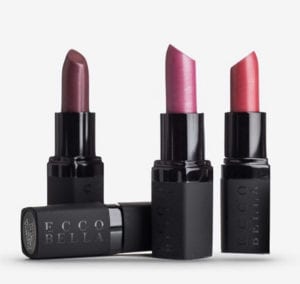 Products: Lipstick, Lip Smoother (Like chapstick), Lip gloss, and Lip pencils
Products: Lipstick, Lip Smoother (Like chapstick), Lip gloss, and Lip pencils
Other Products include: Makeup, hair products, and lotion
Price: $
Eco-Friendly Ingredients: ![]() – natural preservatives, ethical sourcing, plant-based, and chemical free
– natural preservatives, ethical sourcing, plant-based, and chemical free
Palm Oil Free:![]()
Sustainable Packaging: ![]() – They are working towards having all bio-degradable packaging and currently have refillable compacts to reduce waste.
– They are working towards having all bio-degradable packaging and currently have refillable compacts to reduce waste.
Cruelty-free:![]() – No animal harm + vegan
– No animal harm + vegan
Overall Quality: ![]() – fragrance free and won’t dry out lips
– fragrance free and won’t dry out lips
Additional Benefits: No microbeads (these are tiny plastics that are often in beauty products), they use ingredients to create an “Ecco Shield” meaning their products protect your skin from the sun and even harsh lighting.
100% PURE
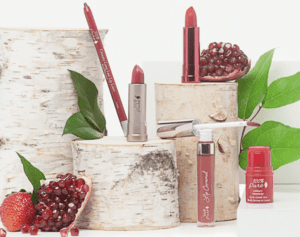
Products: Lipstick, Lip balm, Liquid lipstick, and lip gloss
Other Products include: All makeup, makeup brushes, skincare, hair/body products, sunscreen, hand sanitizer
Price: $
Eco-Friendly Ingredients: ![]() – 100% natural ingredients, vegan, and gluten-free
– 100% natural ingredients, vegan, and gluten-free
Palm Oil Free:![]()
Sustainable Packaging![]() – All packaging, products, and even the ink are 100% biodegradable. They use a combination of recycled plastic, paper, tin, and glass.
– All packaging, products, and even the ink are 100% biodegradable. They use a combination of recycled plastic, paper, tin, and glass.
Cruelty-free:![]() – No animal harm + vegan
– No animal harm + vegan
Overall Quality: ![]() – All lipsticks and other makeup have no dyes and are pigmented by fruit and the natural ingredients.
– All lipsticks and other makeup have no dyes and are pigmented by fruit and the natural ingredients.
Additional Benefits: Products are designed to accommodate all skin types and allergies, they work to reduce carbon emissions and save water in their locations, and support over a dozen charities.
Have a question, concern, or suggestion about any of these products? Have a request for an article? Leave a comment below
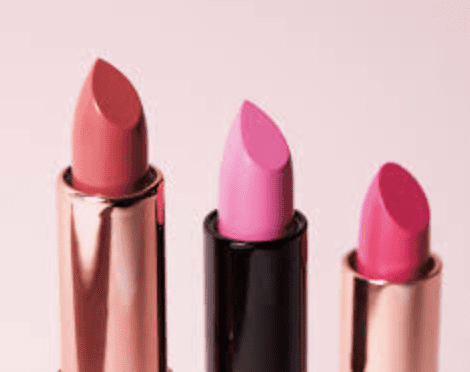
Hi Diane, I believe 100% Pure has been sold through QVC, however they are not currently selling their products. I am not sure if QVC is just temporarily out of stock or if they are no longer selling the products because 100% pure is still listed as a brand on their website. Hope this answers your questions!
Emma,
Regarding the 100% pure brand..
I believe years ago when they originally started, they were selling their products on QVC. If this is the same company, I purchased several items and really liked them. Anyway you could find out?
That’s a great question! Palm oil is generally produced by cutting down thousands of acres of trees in the Amazon rainforest and extracting it from a certain type of vegetable grown from these trees. There are a few sustainable methods out there, but the majority of palm oil production causes deforestation, loss of wildlife, and several other issues. Palm oil is found in about 50% of packaged products in the US – think food, hair products, you name it, so getting palm oil free products or products that sustainably source palm oil can make a big difference. You can learn more here.
You mention palm oil…maybe there’s a post somewhere that explains it more, but why is palm oil an issue? I’d like to learn.